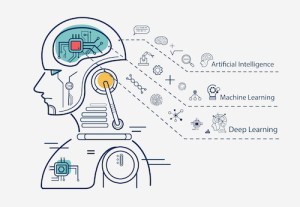Deep learning is a segment of machine learning. In essence, it’s an artificial neural network with three or more layers. Neural networks with only one layer can make estimated predictions. The addition of more layers can assist with increasing optimisation and accuracy.
These neural networks aim to simulate the natural behaviour of the human brain, allowing it to learn from a massive amount of data.
So what is deep learning used for?
Deep learning helps operate numerous artificial intelligence (AI) applications. It’s designed to boost automation by performing systematic and physical tasks without the need for human input.
Examples of deep learning used in everyday life:
- Voice-enabled technology, such as TV remotes
- Virtual assistants
- Credit card fraud detection
- Chatbots and service bots
- Image analysis
- Customised shopping and entertainment
It’s clear to see that deep learning is affecting the world of business in increasingly dramatic ways. It looks likely that this trend is going to continue long into the future. For instance, using deep learning to help operate self-automated cars, drones, and delivery trucks.
Whilst we may not be living in a sci-fi world of complete AI takeover, modern businesses are using machine learning and deep learning to turbocharge their efforts toward digital transformation.
Artificial Intelligence is a great way for businesses to put their data on customer interactions to good use.
The use cases of deep learning in business
Whether you know it or not, deep learning is and has been affecting your daily life for some time now.
Let’s use Twitter as an example. Twitter enhanced its users’ timelines to showcase the best Tweets first. They did this by improving their underlying algorithm to display content that is the most relevant to its users.
Twitter’s ranking algorithm is powered by neural networks, aka deep learning. They want to expand their use of deep learning in areas of Natural Language Processing (NLP), media domains, and more.
In the early days of Twitter and most other social media platforms, the news feed was displayed chronologically and did not require the use of deep learning for its structure.
Deep learning and CRM: improving the customer journey
Whilst businesses of all sizes are just beginning to take advantage of the benefits of deep learning, many have already realised the benefits of CRM. Now the two are being used in conjunction with each other.
So how can deep learning improve your CRM?
Sales: It can analyse product images attached to a deal and use that information to suggest the best upsell and cross-sell opportunities.
Service: It can analyse images of a product attached to a service case and use the information to classify the case and route it to the right agent.
Marketing: It can analyse images across Facebook, Pinterest, and Twitter to suggest the best visuals for an upcoming advertising campaign. It can even identify brands in the images whether or not they’re mentioned in the text.
Source: Take a deep dive into artificial intelligence
According to a Forrester report, The State of CRM, 50% of executives say that their main intention for their CRM platform over the next few years is to invest in AI-powered automation.
How AI in business will affect employment?
As mentioned earlier, deep learning helps operate many AI applications. This is great for businesses but there has long been a perception that AI adoption is going to cause mass unemployment. Many workers are worried that the use of AI will make their roles redundant.
Based on current trends, this looks unlikely. AI in business is causing a shift in demand for certain skills and will probably require many employees to be re-trained. However, for many people, AI is going to have only positive effects on their employment.
According to the Forrester report, 78% of businesses will be using AI to relieve employees from day-to-day processes. A further 69% of employers say they want to use AI to free up employee time for work that matters, rather than menial tasks.
How using AI in business can make teams work smarter
The growing trend towards customer-centricity means that customers are now expecting businesses to provide personalised customer journeys. They want to be remembered from their first engagement with the business to their last.
As an example, when a customer calls in at a call centre with a query and then also calls in the next day to discuss the query again, they will expect the second employee to remember the first conversation they had. Without AI or CRM this is an incredibly difficult task for employees to achieve.
The main takeaway from the Forrester report is that businesses are expecting AI to make employees better at their jobs, and not replace them. Furthermore, the report shows that employees are both eager to get more training with AI, and eager to be provided with more AI-powered recommendations.
AI-powered automation and its effects on business
AI-powered recommendations are going to bring immense benefits for both customers and employees. However, some businesses will need to undergo dramatic changes to company culture.
Hierarchical, rigid organisations will see for themselves the democratising force of AI. Tools like deep learning require interdisciplinary collaboration across the organisation. This is likely to lead to a new AI-powered company culture.
Artificial Intelligence in business is not just about taking responsibilities away from employees, it is about empowering them to make better decisions using the data.
To find out what business leaders are getting most excited about when it comes to Enterprise AI, download the Forrester, The State of CRM report.
























